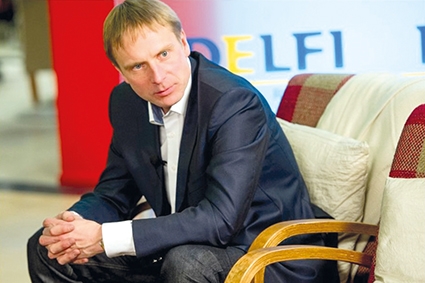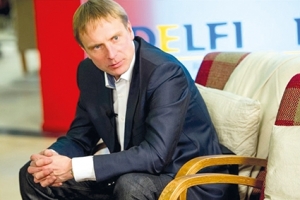“The Day Russia Stopped the Expansion of NATO” – by the James Bond of the Baltics
Exclusive Interview
For those hard of hearing, Vladimir Putin made his intentions clear when speaking to then-French President Nicolas Sarkozy on August 15, 2008: “I am going to hang Saakashvili by the balls!” Saakashvili in the end, as he often boasts, retained a hold on both of his cojones and Georgia (for another four years). The five-day August War between Georgia and Russia, however, was a major geopolitical occasion which largely announced the blueprint of what to expect from Putin’s Russia. Many think it was a lesson the West disregarded, only to come to regret. One who does is Eerik-Niiles Kross, Saakashvili’s Estonian National Security Adviser during and after the war. The Georgian President was and still is a colorful character and he chose his entourage accordingly. Kross, now a member of the Estonian Parliament, is a man wanted in Russia (for hijacking a ship, no less), is barred entry in the US and was named among Politico’s 28 Most Influential Politicians this year, with the outlet dubbing him the Baltic James Bond. In true Bondesque fashion, it was in South America that we tracked him down to share his perspective on the August War 10 years on.
At the Bucharest summit in 2008, Georgia was promised eventual NATO membership. What role did this promise play in what happened next?
The 2008 Bucharest Summit was a decisive moment and maybe even a turning point. Georgia and friends of Georgia in Europe and the US were lobbying hard for Georgia and Ukraine. The orange government in Ukraine was also trying to get closer to NATO. At that time, President George Bush was personally calling the leaders of different countries, trying to convince them that MAP was a good idea. One can say it was the first time in NATO history the US president lobbied for somebody and didn’t get what he wanted. The Russians were lobbying hard against it, making many NATO countries nervous, particularly the Germans and French. The result was a compromise and it was a bad compromise in many regards because it didn’t give MAP to Georgia and Ukraine, a clear victory for Russia showing it could influence NATO decisions. Yet NATO did give a vague promise of membership, even though it was an empty promise: no timeline, no map, nothing to support it. The Russians took it badly and it was probably then they decided to act. You could say Russia stopped the expansion of NATO in summer 2008.
Then-NATO Sec Gen, Jaap De Hoop Scheffer, recently argued that Russia’s actions were “understandable” and “the West must respect the Russian red line”. Is it hindsight or change of heart?
It’s a very sad statement. It’s always been NATO policy that every country can and should define its own security arrangements. There’s no outside force that can determine it. So to give Russians any rights to decide on that is unacceptable.
On paper, the Western narrative goes that NATO expansion does not pose a threat to Russia. But when the Kremlin is making comments that not only NATO membership but also installment of an anti-missle defense system in Georgia will solicit some kind of response from Moscow - How much use is it saying that it’s not a threat to Russia?
Of course, Russia says it’s a threat, that they are surrounded by hostile liberal democratic western empires wishing to conquer it; unfortunately, that’s one of the narratives they tell their own people. It doesn’t make it more real. The Russians think Ukraine is not really a country; they also think that they liberated Europe, they entertain many an interesting thought. If you really look at the western policy, it’s obvious that we’ve let the Russians get away with a lot of aggressive deeds that might actually cost us dearly in the future. I always remind people that in August 1939, two weeks before WWII started, the British and French diplomats urged Poland not to mobilize forces; why? Because it might provoke Hitler. That “don’t provoke Putin” narrative is of the same caliber.
Who do you think provoked whom in August 2008?
It’s a classical situation where strategically and tactically is a kind of mix up. It’s true that tactically the Russians did provoke Georgia and tried to get some kind of reaction out of the Georgian government; but any country needs to react when it’s being attacked; how long will you let someone shoot your village? It’s part of an aggressive plan. Strategically, the mere existence of pro-NATO democratic countries next to Russia is a provocation to Russians. Successful Georgia and Ukraine by itself is a provocation. Successful Baltic states are not liked in Moscow for that reason. One has to be independent, pro-western next to Russia and then your existence is a threat to Russia. And this will inevitably result in countermeasures from Russia. How far will they go? That depends on a multitude of factors. Had the West reacted forcefully, the war could have been avoided. At the same time, nobody saw what was going to happen; we knew the Russians were probably planning something, Georgia had been telling the West for months, but nobody in the West imagined a full scale military attack; even after we had all the red flags on the map, everyone was still surprised when the war actually broke out.
Do you think the fact President Bush personally warned Putin, and warned Saakashvili and Georgia not to accept provocations, actually gave russia a green light?
I would not exclude that. Don’t bug Putin. He wanted to prove that President Bush was wrong. Putin is very good at reading the overall situation; he usually takes steps when he knows he can get away with it; he didn’t take Crimea thinking someone would take it back from him; he also didn’t invade Georgia thinking there would be retaliation; but he also didn’t go to Tbilisi, because he knew he wouldn't get away with it. There was diplomatic pressure and collectively they were stopped, but still, whatever the West did diplomatically was not enough to prevent the war.
What should the West have done better before and after?
The question really is whether the West was prepared to fight for Georgia. At that time, no, it wasn’t. There was no treaty obligation. Realpolitik is what it is. President Bush was not ready to go to war. What the West did after the war is even worse – it was doing business with Russia three months after the war as if nothing had happened. Putin’s methods were correct; he went as far as he thought he could get away with.
2008 also saw Russia employ cyber-attacks for the first time, another dimension of the hybrid warfare Russia continues to wage. What’s your account of what happened then?
The cyber-attacks started earlier. Russians at that time were not as sophisticated as they are now; then again, Georgia of course was not that prepared either, but at the same time Georgia’s infrastructure was not that dependent on cyber. What Russia tried to do more was to discredit, hack web pages, take down some of the communications; they were able to jam Georgian military communications, to intercept, to confuse the command lines by making it unclear who was giving the order. I’m sure all the emails and calls from Tbilisi were intercepted.
As an adviser to Saakashvili, what was your advice to counter the Russian propaganda that emerged after the war?
My advice was that we didn’t need any propaganda, just to give western media full access; to give them as much information as we could. An international press center was opened in the Tbilisi Marriott hotel, so they got as many briefings as as possible. The Russians tried to control the narrative; they fabricated many stories; they tried to sell their package to the western media; it worked at first but then western media arrived in Georgia and got to report freely and that changed the attitude.
One of the most enduring images of the war was Saakashvili chewing his tie. And then there was the Hollywood film that the government commissioned - 5 days of August. How did these visuals damage or aid conveying the Georgian perspective?
The Russian spreading of the tie photo was a typical maneuver and I don’t see it did much damage. I haven’t actually seen the film, though I hear it’s very bad; it wasn’t discussed with me while it was being made and was probably Saakashvili’s idea. A good Hollywood film can be a very powerful tool; think of Braveheart – a Georgian Braveheart would have been a good film. Of course, Braveheart was made by Mel Gibson and this film by Renne Harlin, but the theory still holds true.
The current Georgian government tries to pin all the blame for 2008 on Saakashvili. What do you think of this approach?
In the Baltic states, you have political forces that try to blame Estonia, Latvia, and Lithuania for being occupied by Russians in 1940. Those domestic political games are not constructive; it doesn’t serve the interests of the country and it’s not smart politics. We all know that Saakashvili made mistakes but he didn’t invade his own country.
10 years on - What is the legacy of the august war?
It’s sad to say but the West learned a lot and many European countries enhanced their defenses for the blood price paid by Georgians; it was the beginning of a new period in European history- this struggle is not over.
By Vazha Tavberidze












